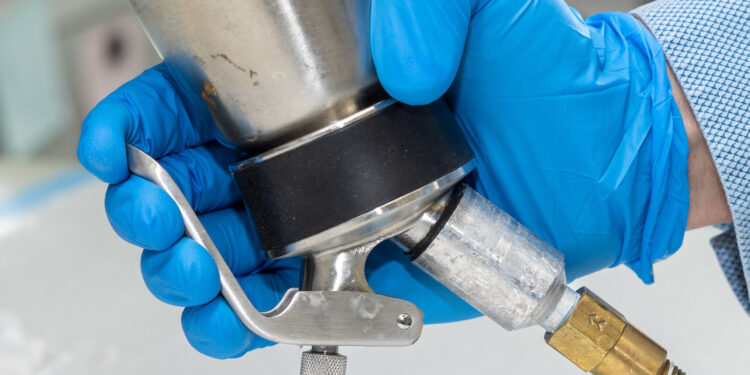Carbon monoxide-infused gas-trapping foam enhances the anticancer activity of autophagy inhibitors, which may help improve therapies for many different cancers. Credit: University of Iowa Health Care
Did smokers perform better than non-smokers in a clinical trial of an experimental cancer treatment? That’s the intriguing question that led University of Iowa researchers and their colleagues to develop a drinkable carbon monoxide-infused foam that boosted the effectiveness of the therapy, known as carbon monoxide inhibition. autophagy, in mice and human cells.
The results were recently published in the journal Advanced science.
Finding ways to exploit biological differences between cancer cells and healthy cells is a standard approach to designing new cancer treatments. But it is a laborious process that requires a deep understanding of the complex biology of cancer and often a dose of unexpected knowledge.
The potential of autophagy inhibitors
Researchers have known for several decades that autophagy, which is the cell’s natural recycling system, is increased in cancer cells compared to healthy cells, suggesting that inhibiting autophagy could be a way to target cancer cells. However, results from nearly 20 clinical trials testing autophagy inhibitors have been inconclusive.
“In these clinical trials, they found mixed results; there were some benefits, but for many patients there was no benefit, which really pushed the researchers back to the drawing board,” says James Byrne, MD, Ph.D., UI assistant professor. radiation oncology and biomedical engineering and lead author of the new study.
In seeking to understand why autophagy inhibition only seems to work sometimes, researchers made the surprising discovery that smokers in two of the previous autophagy inhibitor trials appeared to have better results than smokers. non smokers.
“When we looked at the results of smokers in these trials, we saw an increase in overall response in smokers who received autophagy inhibitors, compared to patients (non-smokers), and we also saw an fairly significant decrease in the size of the target lesion,” says Byrne.
This is an exciting finding for Byrne and his team because smoking is also associated with increased levels of carbon monoxide, a gas molecule that can increase autophagy in cells in a way that, according to researchers, could enhance the anticancer effect of autophagy inhibitors.
“We also know that smokers have higher carbon monoxide levels, and while we definitely don’t recommend smoking, this suggests that elevated carbon monoxide might improve the effectiveness of autophagy inhibitors. We “We want to exploit this advantage and integrate it into a therapeutic platform,” says Byrne, a member of the University of Iowa Holden Comprehensive Cancer Center.
Carbon monoxide stimulates anticancer activity of autophagy inhibition
The team already had such a “platform” to test its ideas. Byrne specializes in manufacturing gas trapping materials (GEM): foams, gels and solids made from safe, edible substances that can be infused with different gas molecules. Researchers created a drinkable foam infused with carbon monoxide for this study.
When mice with pancreatic and prostate cancers were fed carbon monoxide foam and simultaneously treated with an autophagy inhibitor, tumor growth and progression were significantly reduced in the animals. The team also showed that combining carbon monoxide with autophagy inhibitors had a significant anticancer effect on human prostate, lung and pancreatic cancer cells in petri dishes.
Ultimately, Byrne hopes to test this approach in human clinical trials.
“The results of this study support the idea that therapeutic and safe levels of CO, which we can deliver using GEM, can increase the anticancer activity of autophagy inhibitors, opening a promising new approach which could improve therapies for many different cancers.” he says.
More information:
Jianling Bi et al, Oral carbon monoxide improves autophagy modulation in prostate, pancreatic and lung cancers, Advanced science (2023). DOI: 10.1002/advs.202308346
Provided by University of Iowa
Quote: Drinkable foam infused with carbon monoxide improves effectiveness of experimental cancer treatment (January 12, 2024) retrieved January 12, 2024 from
This document is subject to copyright. Apart from fair use for private study or research purposes, no part may be reproduced without written permission. The content is provided for information only.



